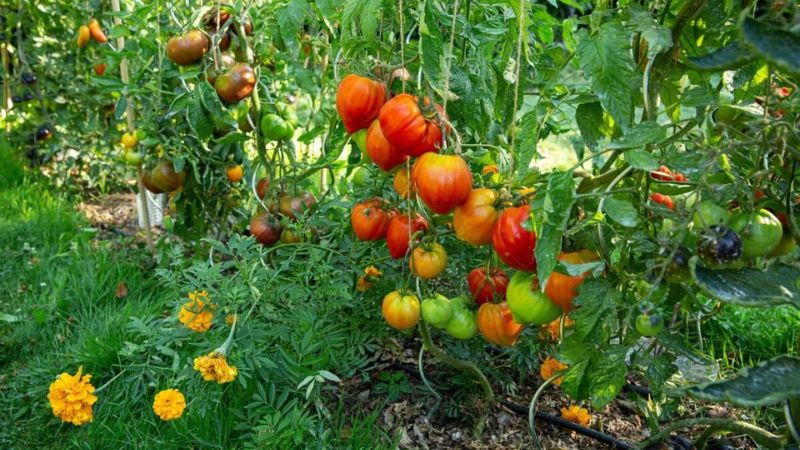Tomatoes are a staple in many gardens, prized for their juicy fruits and versatility in the kitchen. However, not all plants make good companions for tomatoes. Some plants can hinder their growth or attract pests that can damage your tomato crop. Here are seven companion plants you should avoid growing with tomatoes to ensure a healthy and productive garden.
1. Corn

While corn may seem like a natural companion for tomatoes due to their tall stature and different growth habits, they actually compete for similar nutrients in the soil. Both tomatoes and corn are heavy feeders, particularly requiring nitrogen. Planting them together can lead to nutrient deficiencies and stunted growth in both crops. It’s best to keep them separate and give each the space and nutrients they need to thrive.
2. Potatoes
Tomatoes and potatoes belong to the same plant family, Solanaceae, making them susceptible to similar diseases and pests. Planting them together increases the risk of spreading diseases like late blight, which can devastate both crops. Additionally, potatoes can compete with tomatoes for resources like water and nutrients, reducing the overall yield of both plants. To avoid problems, plant tomatoes and potatoes in different areas of your garden.
3. Cabbage and Broccoli
Members of the brassica family, including cabbage and broccoli, should not be planted near tomatoes. These plants can attract common pests like cabbage worms and aphids, which can also affect tomatoes. Furthermore, cabbage and broccoli are heavy feeders that require a lot of nutrients from the soil, potentially depriving tomatoes of essential resources. Keep these plants separate to prevent pest infestations and ensure optimal growth.
4. Fennel

Fennel is known for its strong aroma and can release compounds that inhibit the growth of nearby plants, including tomatoes. Planting fennel near tomatoes can stunt their growth and affect their flavor. Additionally, fennel attracts certain pests like aphids and caterpillars, which can harm tomatoes as well. To promote healthy tomato growth, avoid planting fennel in close proximity to your tomato plants.
5. Dill
Similar to fennel, dill can release compounds that inhibit the growth of nearby plants, including tomatoes. Planting dill near tomatoes can negatively impact their development and yield. Additionally, dill attracts pests like aphids and tomato hornworms, which can cause damage to tomato plants. To avoid these issues, keep dill away from your tomato patch and plant it in a separate area of your garden.
6. Rue
Rue is another plant that can inhibit the growth of nearby plants, including tomatoes. It produces compounds that act as natural herbicides, affecting the growth and health of neighboring plants. Planting rue near tomatoes can lead to stunted growth and poor yields. Additionally, rue can attract pests like aphids and caterpillars, further compromising the health of tomato plants. It’s best to avoid planting rue near your tomatoes to ensure optimal growth and productivity.
7. Walnuts

If you have walnut trees in your garden, be cautious about planting tomatoes nearby. Walnut trees release juglone, a chemical compound that can inhibit the growth of many plants, including tomatoes. Tomatoes planted near walnut trees may exhibit yellowing leaves, stunted growth, and reduced fruit production. To avoid these issues, keep tomatoes at a safe distance from walnut trees and plant them in an area with suitable soil conditions.
By avoiding these companion plants, you can help ensure the success of your tomato crop and enjoy a bountiful harvest. Proper planning and thoughtful companion planting can lead to a healthier and more productive garden overall.
